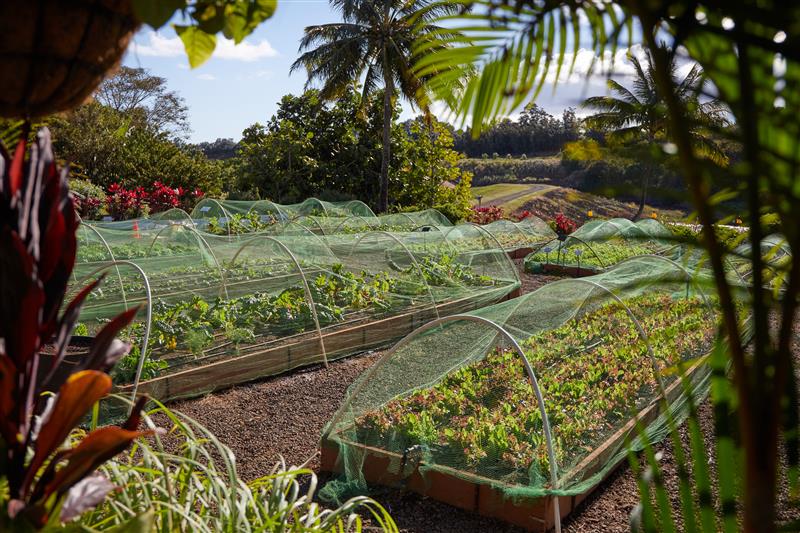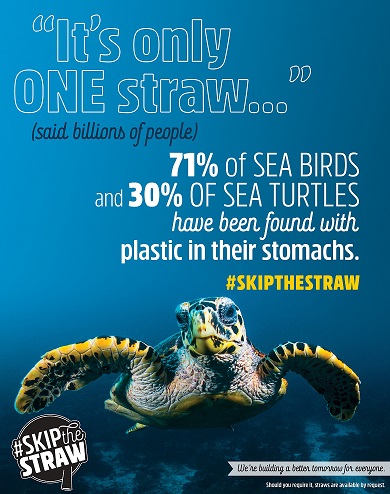
Sustainability
Our Initiatives
We work very hard to live up to our commitment of sustainability as we operate the dining facilities at UH Manoa campus. Here are some of our current efforts towards sustainability and additional information on these initiatives: We purchase local first! Currently 30% of products used in our food services are local Trayless dining at all our locations saves on water and energy usage, and food waste. Renovation of dining rooms in Campus Center Food Court and Stir Fresh with sustainable furniture
Recycling
On campus we recycle the following products: cardboard, glass, aluminum, paper, plastic.
Recycling Fryer Oil into Biofuel
French fries to fuel. Indeed, our fryer oil is recycled into biodiesel that is used to power a variety of vehicles - from delivery fleets to farm equipment.
Printing on Both Sides of the Paper
To save paper, we use paper with recycled content and we print on both sides whenever possible.
Our Programs
Trayless Dining
Click Enter to see the detailsWe are a trayless campus. Customers without trays typically waste less food and beverages. It is also a healthier approach to eating, as we all know that at times our eyes are bigger than our stomach. Trayless dining also reduces the amount of water and detergents needed to wash trays - and saves energy too!
Weigh the Waste
Click Enter to see the detailsDid you know that 40% of the food produced in our country is wasted? Periodically throughout the school year, we conduct a Weigh the Waste event. During the event, we weigh all of the uneaten food from guest’s plates. We consolidate the findings and report back to the community. We tie this to an awareness campaign that informs guests about food waste and its impact to our environment and our communities. We hold frequent campaigns in which we compare our results (and hopefully see our waste decline).
Bulk Condiments
Click Enter to see the detailsIndividual packets of condiments are useful in some instances, but they result in extra waste. If you are dining on site or you can add the sauce to your item before you leave, please use the bulk dispensers to reduce our waste.
Choose to Reuse
Click Enter to see the detailsChoose to Reuse is a reusable container program designed to reduce waste and help achieve Sodexo's Better Tomorrow commitments by replacing single-use disposable food and beverage containers with reusable containers.
Reusable Dishware
Click Enter to see the detailsWe offer china dishes in our dining locations. This reduces waste associated with using disposable containers. Dining in? Be sure to use china. We also use china at our catered functions on site.
Sustainable Catering
Click Enter to see the detailsAll it takes are a few simple steps to more sustainable catered events. We feature menus that are locally grown, seasonal, organic, vegetarian and/or well balanced. We use china service ware whenever possible, but if necessary, we try to use compostable and/or recyclable disposableware. We strive to eliminate bottled beverages when possible by replacing them with pitchers of drinks and reusable glassware.
Each season we unveil a catering menu that highlights the season's bounty. Not only does it increase variety, it also features food that is in season.
“Green Seal”- Green Cleaning
Click Enter to see the details92% of the chemicals Sodexo uses are “Green Seal” certified, concentrated or sustainable.
Organic
Click Enter to see the detailsOrganic food is produced by farmers who emphasize the use of renewable resources and the conservation of soil and water to enhance environmental quality for future generations. Organic meat, poultry, eggs, and dairy products come from animals that are given no antibiotics or growth hormones. Organic food is produced without using most conventional pesticides; fertilizers made with synthetic ingredients or sewage sludge; bioengineering; or ionizing radiation. Before a product can be labeled ‘organic,’ a Government-approved certifier inspects the farm where the food is grown to make sure the farmer is following all the rules necessary to meet USDA organic standards. Look for the menu icon identifying organic foods.
Composting
Click Enter to see the detailsFood waste in landfills creates methane, a greenhouse gas which is 21x more potent than CO2. (www.epa.gov) Our first priority is to reduce food waste. We compost food waste that is unavoidable which reduces greenhouse gas emissions and can also be used to amend soil thereby increasing drought tolerance, improving soil structure and health and reducing need for water and fertilizers.
Xprss Nap
Click Enter to see the detailsXprss Nap Dispensers save energy and waste. The napkins are made of 100% recycled paper and the dispenser will encourage customers to take (and waste) fewer napkins. Energy is saved because less power is used to recycle paper products than to create them from virgin material.
Apex
Click Enter to see the detailsAPEX combines technology and products designed to save water and energy, minimize the impact of products on the environment, and has a built-in method of measuring results. The APEX management approach uses a tablet PC and wireless technology to communicate with the system’s controller to download, process and analyze data to establish each foodservice operation’s “rack-to-guest ratio.” By monitoring and improving this ratio, the system helps reduce the amount of water and energy used at each facility, and improve total operational efficiency
Reusable Cup
Click Enter to see the detailsThe environment and your pocketbook win! Bring your own reusable cup to purchase coffee or a fountain soda on campus and receive a discount at every location, every time.
Local Suppliers
Click Enter to see the detailsWe work closely with local produce distributors to maximize the fruits and vegetables purchased from local farms. We also purchase from local dairies, and participate in farm to school initiatives. Tracking local purchases helps us to meet our Better Tomorrow Plan commitment of 20% local purchase by 2020. We currently do 30% local at University of Hawai'i at Manoa.

#SkipTheStraw
Manoa Dining Services is taking steps to reduce our single use plastics by implementing a "by request" Straw Policy at our Resident Dining Halls, Campus Center Food Court, Stir Fresh, and Pizza Hut locations.
